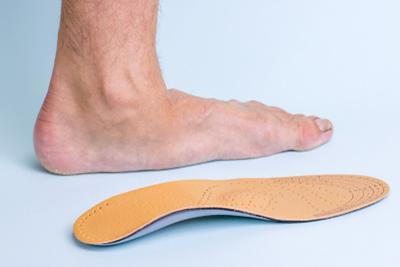How to Prevent Flat Feet From Worsening Over Time

- posted: Sep. 29, 2024
Flat feet is a medical condition characterized by significantly lowering or complete collapse of the foot’s arch. Individuals with this condition will notice that the entire underside of their foot touches the ground when standing. While some flat feet happen without symptoms, others cause discomfort/pain and may even affect mobility. If you live or work in and around Boise, Nampa/Caldwell, and Meridian, ID, and have flat feet, contact Dr. Ryan Kemp, Dr. Kerry Anderson, and Dr. Boyd Andrews of Idaho Foot & Ankle Associates.
What Causes Flat Feet?
There are various causes of flat feet, a medical disorder also known as pes planus, including:
- A congenital birth condition
- Foot/ankle trauma/injury
- Nerve problems
- Inflammation from arthritis
- Carrying too much weight
- The aging process
How to Prevent Flat Feet from Worsening Over Time?
By implementing preventive measures in Boise, Nampa/Caldwell, and Meridian, ID, you can maintain arch health and potentially slow the progression of flat feet:
- Choose/Wear Supportive Footwear
Shoes should have sufficient arch support and cushioning, as poor-fitting shoes only add strain. Custom orthotics/inserts can help with arch support. - Maintain a Healthy Weight
Weight beyond recommended levels adds stress, which can aggravate the condition. - Exercise and Stretch
Do routine exercises (or low-impact activities) that stretch and strengthen the foot and calf muscles. This helps stretch the Achilles tendon. - Manage Underlying Conditions
Diabetes or rheumatoid arthritis often contributes to the condition. Treat foot/ankle injuries to prevent further arch collapse. - Walk With Proper Form
Be mindful of your gait and foot positioning when walking or running. PT can help manage the biomechanical issues that contribute to the problem. - Avoid Excessive Strain
Limit time spent standing on hard surfaces, and take breaks to rest for extended periods of walking/standing.
However, if you experience increasing pain or discomfort, consult a podiatrist for a tailored treatment plan.
Common Flat Feet Treatments
Various self-treatment options exist for managing flat feet. Proper footwear is a smart way to reduce or eliminate symptoms while offering added stability.
Resting, ice packs, proper weight, and nonsteroidal anti-inflammatory drugs (NSAIDs are a temporary solution) can help if swelling/pain occurs.
A podiatrist can, after evaluating your condition, offer recommendations to prevent or manage the condition and symptoms of flat feet:
- Bracing/Taping
- Physical Therapy
- Custom Orthotics
- Surgery
Contact a Leading Podiatrist Today
If you would like additional information, contact Dr. Kemp, Dr. Anderson, and Dr. Andrews, or a staff member of the Idaho Foot & Ankle Associates at (208) 327-0627 (Boise, ID), (208) 463-1660 (Nampa/Caldwell, ID), (208) 888-9876 (Meridian, ID), or online.

- posted: Sep. 29, 2024
Flat feet is a medical condition characterized by significantly lowering or complete collapse of the foot’s arch. Individuals with this condition will notice that the entire underside of their foot touches the ground when standing. While some flat feet happen without symptoms, others cause discomfort/pain and may even affect mobility. If you live or work in and around Boise, Nampa/Caldwell, and Meridian, ID, and have flat feet, contact Dr. Ryan Kemp, Dr. Kerry Anderson, and Dr. Boyd Andrews of Idaho Foot & Ankle Associates.
What Causes Flat Feet?
There are various causes of flat feet, a medical disorder also known as pes planus, including:
- A congenital birth condition
- Foot/ankle trauma/injury
- Nerve problems
- Inflammation from arthritis
- Carrying too much weight
- The aging process
How to Prevent Flat Feet from Worsening Over Time?
By implementing preventive measures in Boise, Nampa/Caldwell, and Meridian, ID, you can maintain arch health and potentially slow the progression of flat feet:
- Choose/Wear Supportive Footwear
Shoes should have sufficient arch support and cushioning, as poor-fitting shoes only add strain. Custom orthotics/inserts can help with arch support. - Maintain a Healthy Weight
Weight beyond recommended levels adds stress, which can aggravate the condition. - Exercise and Stretch
Do routine exercises (or low-impact activities) that stretch and strengthen the foot and calf muscles. This helps stretch the Achilles tendon. - Manage Underlying Conditions
Diabetes or rheumatoid arthritis often contributes to the condition. Treat foot/ankle injuries to prevent further arch collapse. - Walk With Proper Form
Be mindful of your gait and foot positioning when walking or running. PT can help manage the biomechanical issues that contribute to the problem. - Avoid Excessive Strain
Limit time spent standing on hard surfaces, and take breaks to rest for extended periods of walking/standing.
However, if you experience increasing pain or discomfort, consult a podiatrist for a tailored treatment plan.
Common Flat Feet Treatments
Various self-treatment options exist for managing flat feet. Proper footwear is a smart way to reduce or eliminate symptoms while offering added stability.
Resting, ice packs, proper weight, and nonsteroidal anti-inflammatory drugs (NSAIDs are a temporary solution) can help if swelling/pain occurs.
A podiatrist can, after evaluating your condition, offer recommendations to prevent or manage the condition and symptoms of flat feet:
- Bracing/Taping
- Physical Therapy
- Custom Orthotics
- Surgery
Contact a Leading Podiatrist Today
If you would like additional information, contact Dr. Kemp, Dr. Anderson, and Dr. Andrews, or a staff member of the Idaho Foot & Ankle Associates at (208) 327-0627 (Boise, ID), (208) 463-1660 (Nampa/Caldwell, ID), (208) 888-9876 (Meridian, ID), or online.
